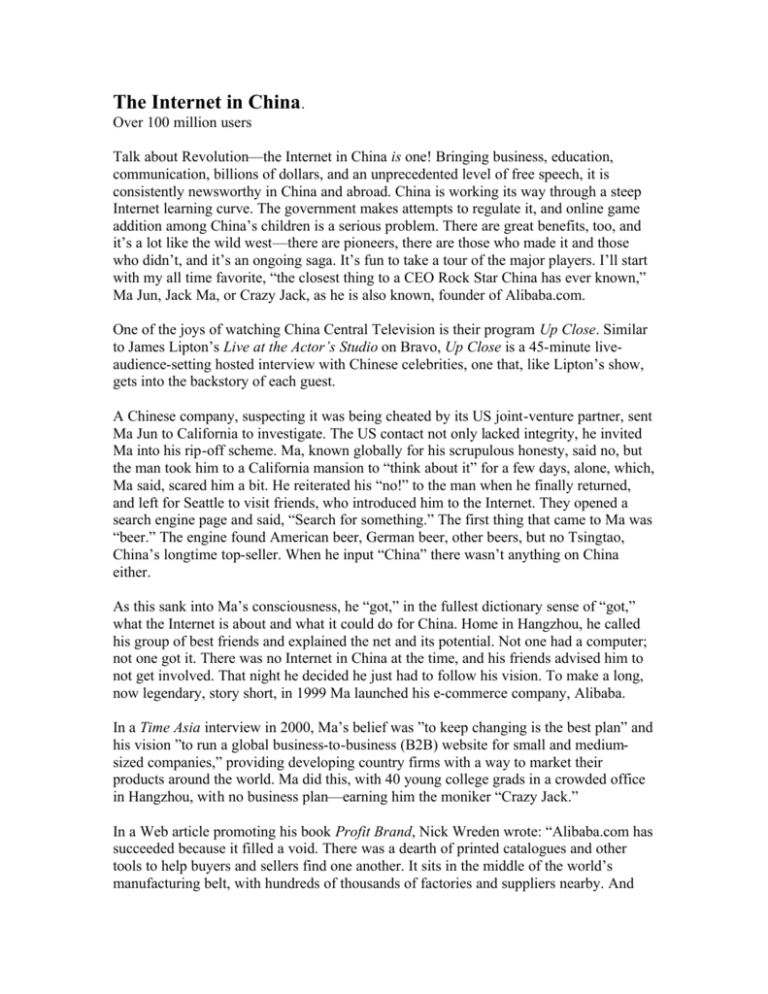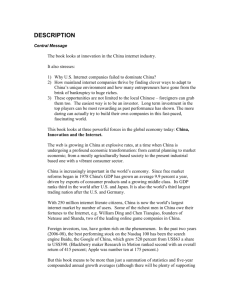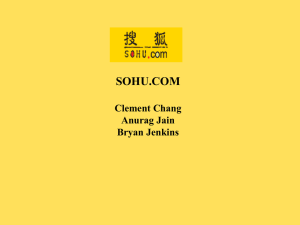an 8 page PDF Document - USCPFA
advertisement

The Internet in China. Over 100 million users Talk about Revolution—the Internet in China is one! Bringing business, education, communication, billions of dollars, and an unprecedented level of free speech, it is consistently newsworthy in China and abroad. China is working its way through a steep Internet learning curve. The government makes attempts to regulate it, and online game addition among China’s children is a serious problem. There are great benefits, too, and it’s a lot like the wild west—there are pioneers, there are those who made it and those who didn’t, and it’s an ongoing saga. It’s fun to take a tour of the major players. I’ll start with my all time favorite, “the closest thing to a CEO Rock Star China has ever known,” Ma Jun, Jack Ma, or Crazy Jack, as he is also known, founder of Alibaba.com. One of the joys of watching China Central Television is their program Up Close. Similar to James Lipton’s Live at the Actor’s Studio on Bravo, Up Close is a 45-minute liveaudience-setting hosted interview with Chinese celebrities, one that, like Lipton’s show, gets into the backstory of each guest. A Chinese company, suspecting it was being cheated by its US joint-venture partner, sent Ma Jun to California to investigate. The US contact not only lacked integrity, he invited Ma into his rip-off scheme. Ma, known globally for his scrupulous honesty, said no, but the man took him to a California mansion to “think about it” for a few days, alone, which, Ma said, scared him a bit. He reiterated his “no!” to the man when he finally returned, and left for Seattle to visit friends, who introduced him to the Internet. They opened a search engine page and said, “Search for something.” The first thing that came to Ma was “beer.” The engine found American beer, German beer, other beers, but no Tsingtao, China’s longtime top-seller. When he input “China” there wasn’t anything on China either. As this sank into Ma’s consciousness, he “got,” in the fullest dictionary sense of “got,” what the Internet is about and what it could do for China. Home in Hangzhou, he called his group of best friends and explained the net and its potential. Not one had a computer; not one got it. There was no Internet in China at the time, and his friends advised him to not get involved. That night he decided he just had to follow his vision. To make a long, now legendary, story short, in 1999 Ma launched his e-commerce company, Alibaba. In a Time Asia interview in 2000, Ma’s belief was ”to keep changing is the best plan” and his vision ”to run a global business-to-business (B2B) website for small and mediumsized companies,” providing developing country firms with a way to market their products around the world. Ma did this, with 40 young college grads in a crowded office in Hangzhou, with no business plan—earning him the moniker “Crazy Jack.” In a Web article promoting his book Profit Brand, Nick Wreden wrote: “Alibaba.com has succeeded because it filled a void. There was a dearth of printed catalogues and other tools to help buyers and sellers find one another. It sits in the middle of the world’s manufacturing belt, with hundreds of thousands of factories and suppliers nearby. And the home-grown company understands Chinese culture and business practices well”—a key element in doing business in China, whether in person or on the Web. Today, Alibaba.com Corporation is China’s leading e-commerce company. Last year Yahoo! put 1 billion dollars into the company. Check out the portfolio. From its Web site: www.alibaba.com, Alibaba International, is an English –language site primarily serving Small and Medium-sized Enterprises (SMEs) in the international trade community, with nearly two million registered users from over 200 countries and territories. 300,000+ people visit the site daily, most of them global buyers and importers looking to find and trade with sellers in China and other major manufacturing countries. www.china.alibaba.com, Alibaba China, is China’s largest online marketplace for domestic trade among businesspeople. With 7+ million registered users, it is a trusted community of members who regularly meet, chat, search for products, and do business online. Customers pay an annual subscription fee for membership, which entitles them to post trade offers and products online, and includes authentication and verification of the member’s identity, performed by a third-party credit agency. www.taobao.com is China’s most popular consumer-to-consumer trading site with 10+ million registered users. It has the highest number of product listings and the highest penetration among China’s Internet users, 100 million and growing. www.Yahoo.com.cn, Yahoo! China, a division of Alibaba.com, is a leading Internet search brand serving China’s consumers and businesses. www.AliPay.com completes Alibaba’s e-commerce transaction chain, allowing individuals and businesses to securely, easily, and quickly send and receive payments online. To provide AliPay, Alibaba partnered with China’s leading banks, including China Merchants Bank, China Construction Bank, Agricultural Bank of China, and the Industrial and Commercial Bank of China. Alibaba.com is the only import-export marketplace named “Best of the Web” six years in a row by Forbes Magazine. The company, home-based in Hangzhou, has approximately 3,000 employees, 14 regional sales offices across China, and other offices in Hong Kong, Silicon Valley, Europe, and Beijing. Not a bad result for popping “beer” into a search engine! The Rest of the Top Chinese Web Sites www.Sohu.com. (Chinese and English) Sohu (Search Fox in Chinese) has the world’s largest online search database in the Chinese language. Company profile from its Web site: Sohu.com Inc. (NASDAQ: SOHU), founded in 1997 by Internet pioneer Dr. Charles Zhang, is China’s premier online brand indispensable to the daily life of millions of Chinese who use the portal network for their news, search, wireless messaging, instant messaging, email, browsing, games, and shopping. Sohu has built one of the most comprehensive matrices of Chinese language web properties and proprietary search engines, consisting of: www.sohu.com, a mass portal and leading online media destination; www.sogou.com, an interactive search engine with over one billion Chinese language indexed Web pages; www.chinaren.com, the #1 online alumni club; www.17173.com, the #1 games information portal; www.goodfeel.com.cn ,a wireless value-added services provider; and www.go2map.com, a leading online mapping service provider—offering choices in information, entertainment, communication, and commerce. “The Internet in China has developed into a mainstream medium, particularly for urban youth who are spending more time online at the expense of watching TV or reading, making it the most effective marketing vehicle for companies to target this highly attractive segment in the Chinese market.” To serve this young, affluent, urban population, Sohu has exclusive online content agreements with Disney, the NBA, the China Open, Formula One, the BAR racing team, AFC Asian Cup, AC Milan, Miss World 2004, and China Daily. Not to mention (can you imagine the office party!) in December of 1995 Sohu was selected the Official Internet Content Service Sponsor of the Beijing 2008 Olympics. It offers mobile services on SMS (short messaging services), MMS (multi-media messaging services), WAP (Wireless Application Protocol), IVR (Interactive voice Response), RBT (Ring Back Tones), and K-Java based platforms. Sohu is headquartered in Beijing, with offices in Shanghai, Guangzhou, and Hong Kong. www.baidu.com The Baidu Story from their Web site: “Many people have asked about the meaning of our name. ‘Baidu’ was inspired by a Song Dynasty poem written more than 800 years ago The poem compares the search for a retreating beauty amid chaotic glamour, with the search for ones dream while confronted by life’s many obstacles: . . . hundreds and thousands of times, for her I searched in chaos, suddenly, I turned by chance, to where the lights were waning, and there she stood, Baidu, whose literal meaning is ‘hundreds of times,’ represents persistent search for the ideal. “Baidu chose a poetic Chinese name because it wants the world to remember its heritage. As a native speaker of the Chinese language and a talented engineer, Baidu focuses on what it knows best—Chinese language search. Applying avant-garde technology to the world’s most ancient and complex language is as challenging as it is exciting. As we diligently disclosed in the Prospectus of our recent Initial Public Offering, we believe there are at least 38 ways of saying “I” in Chinese. It is important that we master all the ways of addressing oneself in Chinese because our users depend on us to address every one of the daily queries. And trust us, pin-pointing queries in the Chinese language is an art rather than a science. “For example, we introduced “phonetic” or “pin-yin” search, which allows our users to type in Chinese keywords using English alphabets. This feature is designed to skip the switching from English inputting to Chinese inputting, and for when the user is not sure of the written form of a keyword.” (How do they do it? In my own small pinyin dictionary, the second-tone Chinese character li has thirteen different meanings represented by thirteen different characters, but only one sound and one written form in pinyin: li. While the site interface is fully in Chinese, one may input English-language or pinyin queries. Clive Thompson’s excellent article in the New York Times Magazine of April 23,2006 “Google’s China Problem (And China’s Google Problem): Just what are Chinese Internet users searching for?” (an abbreviated version is online) explores the Internet jockeyingaround in China. He says “Baidu, a Chinese search engine that was introduced in 2001 as an early competitor to Yahoo, capitalized on the national fervor for chat and invented a tool that allows people to create instant discussion groups based on popular search queries. When users search . . . for Yao Ming, they are shown not only links to news reports on his games; they are also able to join a chat room with thousands of others and argue about him. Baidu’s chat rooms receive as many as five million posts a day.” Baidu is also famous for having made downloading pirated MP3s easy. www.sina.com.cn www.sh.sina.com.en www.gd.sina.com.cn www.sina.com.hk www.sina.com.tw www.sina.com Beijing Shanghai Guangzhou Hong Kong Taiwan California, US From their Web site: “SINA.com is an online media and entertainment service provider, committed to becoming an all-in-one online community for the global Chinese population. As the leading Internet brand name in China and global Chinese communities, SINA.com provides its 85 million users with a full range of comprehensive and well-timed Chinese-language content, multi-functional and easy-to-use Web space, and cutting-edge ways of enabling free and easy communications worldwide. By cooperating with about 600 content providers, SINA operates over 30 channels on its localized web sites across China. SINA News works with thousands of domestic news media and is known in the industry and among netizens for quick and comprehensive coverage of domestic and overseas events. SINA Sports boasts the world’s largest Chinese BBS and offers news and features. SINA offers Finance, Auto, and Real Estate information. SINA Game is China’s largest game information site. SINA Eladies, launched with L’Oreal, is the most influential vogue site in China. SINA Video provides entertainment, infotainment, and multimedia content. SINA WAP provides products and services in Graphics & Ring Tones, Chatting & Dating, Fashion & Life, and Games & Entertainment. SINA Blog is an online publishing tool for users to collect and document their personal stories and life experiences. SINA BBS is a communication platform for SINA netizens to exchange and share their life attitudes and political viewpoints with others in the SINA online community. “With 180 million registered users worldwide, 450 million daily page views, and over 42 million active users for a variety of fee-based services, SINA Corporation (NASDAQ: SINA) is the most recognized Internet brand name in China and among Chinese communities globally.” www.dangdang.com Online bookseller Dangdang.com is China’s Amazon.com. Internet pioneer Peggy Yu attended university in the US, and, while working as a consultant on Wall Street, observed the rise of Amazon.com. “Armed with an MBA and her husband Li Guoqing, boss of Science and Culture Book Information Co. Yu decided to give online bookselling a try. In 1997, aged 32, she moved back to Beijing from New York, joining a steady trickle of returnees (the Chinese call them Hai gui, sea turtles): young, Western-educated professionals keen to apply their new skill in their own country, and to get rich.” For more, see the Economist article “Thought Leadership” at www.ebusinessforum.com/index.asp?layout=rich_story&doc_id=6658. www.china.com Edited by Jane Lael Editor US-China Review Summer 2006.






